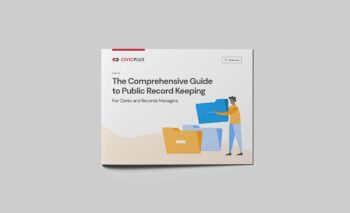What Happens If You Don’t Comply with FOIA Requests
What happens if you don’t comply with FOIA requests? Learn the risks and legal implications of FOIA compliance in our latest blog post.
What Happens If You Don’t Comply with FOIA Requests
The Freedom of Information Act (FOIA), enacted by Congress in 1966, gives the public the right to request records from federal agencies. Since it passed into law in 1967, FOIA has become a cornerstone of transparency and accountability at the federal level.
All 50 states and the District of Columbia have their own versions of FOIA that apply to state- and local-level public agencies. These laws vary in their precise definition of “public records,” the timelines they grant agencies for fulfilling requests, the types of records they consider exempt, the penalties they impose, and more.
Who Do FOIA Regulations Apply To?
Entities commonly subject to FOIA and its state-level equivalents include:
- Cities and counties
- Public colleges and universities
- State agencies and departments
- Public safety agencies
- School districts and charter networks
- Special districts
What Constitutes a FOIA Violation?
FOIA violations can take many forms, including:
- Not acknowledging a request within the legally mandated timeline
- Repeated or deliberate failure to meet response deadlines
- Excessive or unjustified redactions
- Withholding agency records without citing a valid exemption
- Losing or ignoring requests due to poor internal practices
Whether accidental or deliberate, these violations expose your agency to significant risk.
How Does FOIA Non-Compliance Happen?
Even well-staffed and well-intentioned agencies can fall short of FOIA compliance due to avoidable missteps or systemic issues. Here are some common reasons that agencies get into trouble:
- Overlooked or lost requests: Sometimes a request simply slips through the cracks. High volumes, manual tracking processes, and miscommunication are all common culprits. Agencies must develop robust systems for ensuring every incoming request is logged, tracked, and addressed within the mandated time frame.
- Failure to redact sensitive information: Agencies are responsible for redacting personally identifiable information (PII) and other sensitive content before releasing records to requesters. Inadequate redactions may result in exposure to legal risks and loss of public trust.
- Missed deadlines: Many states impose timelines for acknowledging and responding to requests, typically within 3 to 20 business days. Even a single missed deadline could constitute non-compliance and expose an agency to legal risks.
- Slow or inefficient payment processing: If an agency requires payment before fulfilling a request, delays in processing those payments can lead to FOIA non-compliance. Agencies should ensure requesters can pay easily and receive confirmation quickly to avoid delays.
- Breakdowns in interdepartmental coordination: FOIA requests often involve collaboration between multiple departments. When one isn’t looped into the workflow, delays can ripple across the process. This is one of the dangers of a decentralized approach without clear roles and communication channels.
- Lack of accessibility: Requesters with disabilities must be able to submit and receive records in accessible formats. Additionally, language access considerations may apply depending on the population served.
FOIA Non-Compliance: The Root Causes
Behind every FOIA violation is usually a systemic issue. Understanding the root causes can help agencies develop better compliance strategies. Common underlying issues include:
- Lack of resources
- Employee turnover
- Outdated technology
- Unclear workflows
- Broad or complex requests
- Decentralized processing
What Can Happen If You Fail to Comply with a FOIA Request?
There are several things that can happen if you or your organization fail to properly comply with a FOIA request:
- Legal action: A requester can sue your agency to compel the release of requested information. A court may order that you comply with the request while compelling your agency to cover the requester’s legal fees.
- Fines and sanctions: Both your agency and you personally may be subject to significant fines if either are found to have acted in bad faith or willfully withheld information.
- Reputational damage: Non-compliance can lead to negative press, social media backlash, and loss of public trust. All of this can harm your agency’s credibility over time, discouraging the public from engaging with you proactively.
- Stress and job loss: Handling FOIA requests without the right tools and processes can lead to burnout and costly mistakes. In extreme cases, it may cost individuals their jobs.
How to Stay Compliant
Fortunately, FOIA non-compliance is avoidable with the right tools and mindset. Agencies that embrace solutions to simplify transparency and build workflows that support it are far less likely to face the consequences of failing to fulfill requests.
Here are some best practices:
- Centralize request intake and tracking: Don’t rely on disparate inboxes and channels. Implement a centralized system to receive, route, and track requests. This reduces the chance of a request being missed or forgotten.
- Standardize your processes: Create and document clear standard operating procedures for handling FOIA requests. Include steps for intake, assignment, communication, redaction, release, payment, and appeals response. Ensure everyone knows their role.
- Invest in purpose-built software: Cutting-edge FOIA software provides process automation, deadline tracking, audit logs, and redaction tools to save time and reduce the risk of human error.
- Audit and improve continuously: Run regular internal audits to analyze response times, identify bottlenecks, and flag recurring issues. Use these findings to inform training and refine processes.
- Build a culture of openness: Agencies that proactively share records and communicate clearly with the public easily build trust. Celebrate transparency and compliance as a core part of your mission.
Where Can You Find Official Guides to FOIA Compliance?
All agencies should familiarize themselves with official resources that support compliance with FOIA and state-level equivalents. These guides help clarify your obligations, outline processes for promoting compliance, and offer best practices to follow.
Federal resources include:
- U.S. Department of Justice Office of Information Policy (OIP): The DOJ provides extensive guidance on FOIA procedures, exemptions, and compliance requirements.
- FOIA.gov: Managed by the National Archives, this site offers detailed statistics on FOIA compliance, answers to frequently asked questions, and general guidance for public servants.
- National Freedom of Information Coalition (NFOIC): This organization promotes open government by providing state-by-state resources, legal updates, and tools for residents and agencies alike.
State resources include:
- State Attorney General websites: AGs typically publish handbooks tailored to their state’s public records request laws. For example, New York’s AG directs residents to consult the Empire State’s Committee on Open Government for guidance on submitting FOIL requests.
- Municipal leagues and county associations: These organizations offer training sessions, checklists, and general guidance.
- State open government commissions: Some states have dedicated bodies that monitor compliance, issue opinions, and provide mediation services.
Learn More About NextRequest
A well-managed public records process offers tangible benefits:
- Reduced risk of litigation
- Improved internal coordination and efficiency
- Boosted community trust
- An empowered team with clear expectations and goals
- Proves your agency’s commitment to transparency and ethics
If your current process relies on spreadsheets, sticky notes, and siloed inboxes, it’s time to modernize. Adopting an automated solution like NextRequest is the best way for local governments to handle FOIA requests. By automating the FOIA request process, government agencies can improve the efficiency and accuracy of the process, reduce errors, and improve compliance.
From intake to release, CivicPlus® makes it easy to comply with public record laws across the country and deliver on your promise of transparency. Try a self-guided demo of NextRequest to see for yourself.


